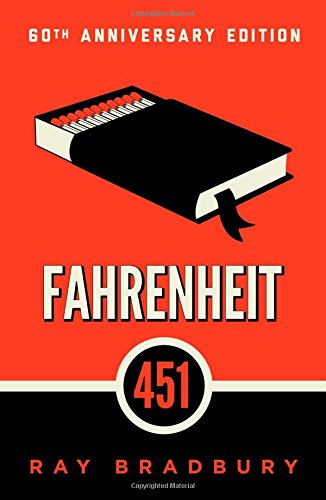All Nonfiction
- Bullying
- Books
- Academic
- Author Interviews
- Celebrity interviews
- College Articles
- College Essays
- Educator of the Year
- Heroes
- Interviews
- Memoir
- Personal Experience
- Sports
- Travel & Culture
All Opinions
- Bullying
- Current Events / Politics
- Discrimination
- Drugs / Alcohol / Smoking
- Entertainment / Celebrities
- Environment
- Love / Relationships
- Movies / Music / TV
- Pop Culture / Trends
- School / College
- Social Issues / Civics
- Spirituality / Religion
- Sports / Hobbies
All Hot Topics
- Bullying
- Community Service
- Environment
- Health
- Letters to the Editor
- Pride & Prejudice
- What Matters
- Back
Summer Guide
- Program Links
- Program Reviews
- Back
College Guide
- College Links
- College Reviews
- College Essays
- College Articles
- Back
Fahrenheit 451 by Ray Bradbury
What would life be like if reading a book was a capital crime? If the people around you didn’t think? These are exactly the questions Ray Bradbury addresses in Fahrenheit 451, a dystopian novel that depicts a society in which life has become empty and devoid of meaning.
Men and women sit and watch endless sitcoms in rooms that have TVs for walls. Their headphones might as well be glued to their ears, for they’re never taken out. There is no intellectual stimulation, no meaningful conversation, no purpose to life at all. Houses have become fireproof, but firemen have found a different task: burning books. Guy Montag, a fireman, has accepted this reality all his life. But then he meets a girl who still has imagination and innocence. And he meets a professor who knows the wisdom of words. He realizes that he can’t remember when he met his wife, and he witnesses his wife overdose on pain medication without even realizing it. He watches everyone around him, moving through life blindly, apathetic and stagnant. He wonders, just wonders, if books hold the meaning that is missing from his life. And when he realizes that they do, his world is never the same.
Each character in Fahrenheit 451 represents an aspect of the flawed society. In Mildred, our protagonist’s wife, we see the content citizen, happy with her “bread and circuses” and ignorant of the absence of meaning in her life. In Professor Faber, we see the discontent, made too afraid by threat of burning and death to act. In Captain Beatty, we see the astute, corrupt man who has convinced himself that, for the greater good, what makes men human must be sacrificed. In Clarisse, Montag’s carefree neighbor, we see the innocence and life that technology has sucked out of society. And in Montag himself, we see a man able to restore meaning in his life, ready to act for change, even if it costs him his life. With enough men like him, ready to take on the challenge of returning humanity to a lethargic society, their goals will be accomplished, their aims achieved, and books will be returned to the shelves once more.
It starts with censorship, slowly banning books people disagree with. From there, the government begins to ban more books, simply because people can’t agree. Suddenly, all the books are gone. And the lethargic, technology-addicted society doesn’t protest. Ray Bradbury makes us wonder: is it possible to become this way ourselves? It certainly seems so, every time I look over to see yet another person with his or her face in a smartphone. The road to a meaningless, dystopian society is much shorter than it may seem. Whether or not humanity takes that path depends on our choices. We can choose intellect over mere entertainment, academia over mindless stimulation. We can choose to maintain a careful balance between technology and morality, science and humanity. We can choose books.
Fahrenheit 451 sends a powerful message to us all, warning us against what will happen if we lose our humanity. If we let technology take the challenge out of our lives. If we stop choosing books.
Similar Articles
JOIN THE DISCUSSION
This article has 0 comments.

